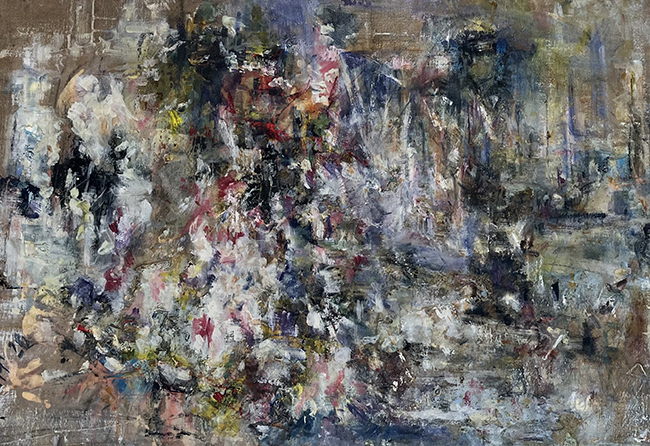Maria Emilov doesn’t separate life from art. For her, painting is a reflection of experience—sometimes subtle, sometimes intense, but always sincere. Born in Sofia, Bulgaria, she began studying art in her early teens. Her creative path has twisted through cities, languages, disciplines, and personal upheaval. Now based somewhere between shifting geographies and internal states, Emilov continues to work across painting, photography, and video.

Her work speaks to moments lived and remembered—moments that linger, reappear, and demand to be processed visually. Her painting ‘Dec 19’ is one of those moments. Created in oils on a piece of prepared old linen, it represents a turning point. It emerged from a time of global instability, personal transition, and inner reckoning. Emilov calls it a soul painting. It’s not just about form or color. It’s about memory, survival, and redefining what matters.
The painting, like many of her works, is intimate yet wide in scope. It doesn’t just tell a story. It holds space—for reflection, for confrontation, and for healing. Emilov paints not to escape reality, but to examine it more closely. Through layered textures and immersive compositions, she draws the viewer into a space that feels familiar yet slightly out of reach. There’s a sense of quiet urgency in her surfaces, like the feeling of recalling something important but not quite naming it.
Emilov’s themes often revolve around protection, change, and the body’s response to its surroundings. She paints what she has lived through: moving countries, adapting to different cultures, reshaping her identity in response to family shifts. These transitions leave imprints, and she captures them—not literally, but emotionally. The past and future blur together. The images aren’t fixed. They’re open-ended, allowing viewers to interpret them through their own lens.
Her work is driven by immersion. She doesn’t stand outside her subject matter. She enters it. Whether it’s a beam of light falling across a surface or the weight of a personal decision, Emilov explores it from the inside out. She often works with depth—both physical and emotional. Her paintings feel layered, not just in technique but in meaning. Light plays an important role. It cuts through shadow, marks transitions, and illuminates details that might otherwise stay hidden.
There’s also a deep sense of care in her work. She sees painting as a way to support and connect—to offer something human and tangible in a world that can feel uncertain or fragmented. Art becomes a kind of compass. It helps her and others navigate through complex emotions and situations. It creates small oases, moments of pause, and reminders that we’re part of something larger.
This sense of connection is important to Emilov. She doesn’t paint in isolation. Her work is in conversation with the world—its chaos, its beauty, its unpredictability. She believes that art helps us belong. It gives us something to hold onto. It marks the path we’re on, and sometimes, it even points us in a new direction.
Her background in communication and education adds another layer to her work. She’s not just a painter. She’s a listener, a thinker, someone who understands the power of expression and the need to be seen and understood. That depth comes through in her images. They aren’t just meant to be looked at. They’re meant to be felt.
While Emilov has exhibited in solo shows and her paintings appear on various art websites, her focus isn’t on recognition. It’s on process. She is more concerned with how a painting lives, breathes, and resonates—how it reflects the inner rhythms of life and change. She paints because she has to. Because there are things that can’t be said any other way.
Big cities energize her. Nature grounds her. Art holds it all together. She’s drawn to places and moments that vibrate with possibility, even if they’re quiet or seemingly mundane. There’s a kind of honesty in her work. It doesn’t shout. It doesn’t pretend. It just stays, present and open.
Maria Emilov’s paintings aren’t about spectacle. They’re about presence. They ask simple but hard questions: What have you seen? What do you carry? Where do you belong? Through color, light, and shape, she builds a space where those questions can live—without easy answers, but with room to breathe.
In a world that often demands speed and certainty, her work offers something slower, more reflective. A chance to pause. A place to remember. A reminder that even in times of emergency or change, there’s a thread worth following—and that thread, for Emilov, is always painting.

